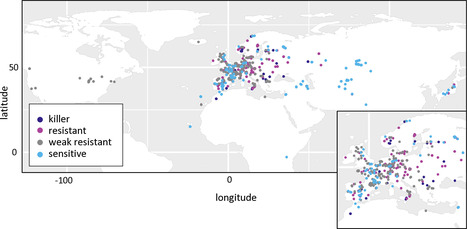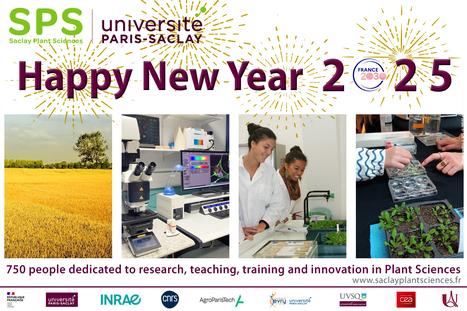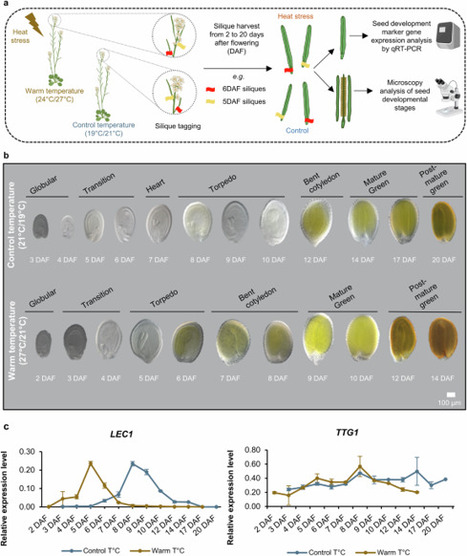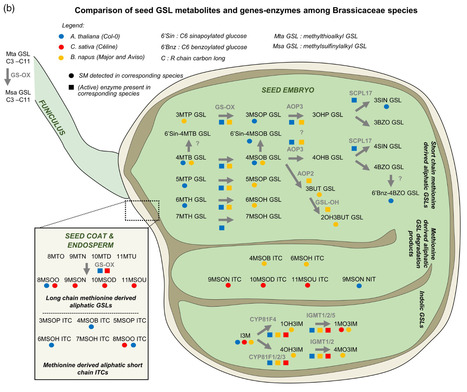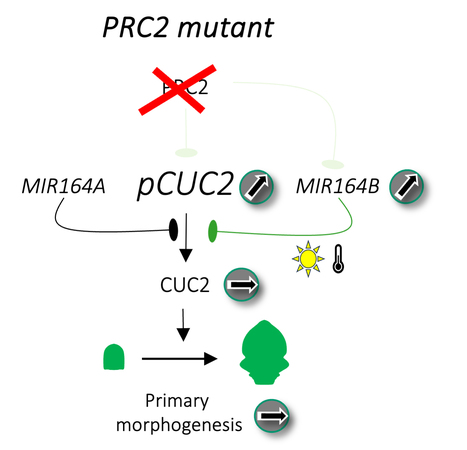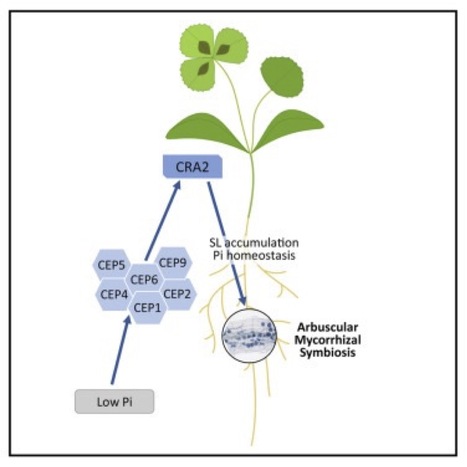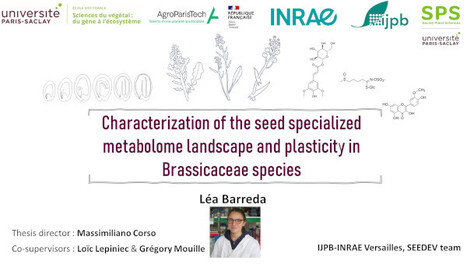 Your new post is loading...
 Your new post is loading...

|
Scooped by
Saclay Plant Sciences
March 11, 12:55 PM
|
As part of a collaborative study between the NUTS team from the Institute Jean-Pierre Bourgin (IJPB) and STRESS team from the Institute of Plant Sciences Paris-Saclay (IPS2), recently published in TThe Plant Journal, scientists have discovered a new signalling pathway that helps plants to acquire nitrogen, a nutrient vital for growth. The study reveals that nitrate, a form of nitrogen taken from the soil, triggers a cascade of molecular events involving specific proteins called MAP kinases. This cascade is initiated by the NLP (NIN-Like Protein) transcription factors and involves MAP3K13 and MAP3K14, two kinases whose role was poorly understood until recently. This discovery adds to our knowledge on plant adaptation to nutrient availability and could lead to strategies for improving nitrogen use efficiency in crops, reducing the use of fertilizers and promoting sustainable agriculture. IPS2 benefits from the support of Saclay Plant Sciences-SPS (ANR-17-EUR-0007)

|
Scooped by
Saclay Plant Sciences
February 28, 3:45 AM
|
https://www.genresj.org/index.php/grj/article/view/genresj.HNCM8135 Arabidopsis thaliana is a powerful plant model for functional biology, genetics and, more recently, population genomics. The Versailles Arabidopsis Stock Center collects, produces, preserves, characterizes and distributes various Arabidopsis biological resources. Besides large collections of mutants, including homozygous mutant lines, this stock centre offers numerous natural genotypes collected worldwide, as well as resources resulting from crosses between these variants. Most of the resources are unique and can be useful to a wide range of users, ensuring cumulative characterization of the same material over time. They are accompanied by molecular characterization, genotyping or sequencing data, enabling the analysis of diversity’s impact, particularly on complex plant traits. The collections are made easily and reliably available through an information system comprising a database and a web portal for description and distribution (https://publiclines.versailles.inrae.fr/). Several thousand seed lots are provided each year to the international scientific community.

|
Scooped by
Saclay Plant Sciences
February 18, 5:28 AM
|
Author summary "Certain genetic elements are qualified as selfish because they favor their transmission to the progeny during reproduction to the detriment of gametes that do not carry them. These elements are widespread in fungi as well as in plants or in animals, and they are made up of two or even three components, which are specific to each species. Therefore, they must be studied on a case-by-case basis. Moreover, understanding how they appear and propagate in local populations remains a major issue in evolutionary biology. Here we have characterized, in the model plant Arabidopsis, the three genes involved in such an element, called a pollen killer. This pollen killer targets the mitochondria to cause the death of pollen grains that do not carry it. We investigated the three genes in several hundred genotypes collected worldwide, giving us a global view of their diversity at the species level. We also found that some French local populations contain both sensitive and killer plants, which constitutes an invaluable resource for studying the evolution of a pollen killer in the wild".

|
Rescooped by
Saclay Plant Sciences
from Plant Sciences
January 28, 3:54 AM
|
The "Plant science in the Anthropocene" (PLANT) workshop will take place from March 24th to April 4th 2025 at University Paris-Saclay. https://eng-saclay-plant-sciences.hub.inrae.fr/events/workshop-institut-pascal
This 2-week workshop will address key challenges for the international Plant Science community, from basic sciences to socio-economic and environmental aspects including climate change. It will gather about 100 international scientists (including 40 speakers).
The program will focus on three themes:
- Theme I: "Frontiers in Plant Science " (March 24-25-26)
- Theme II: “Feeding the planet: roles for Plant Science" (March 27-28-31 and April 1)
- Theme III: "Plants as factories (April 2-3-4) Each of these themes will also cover cross-cutting issues: training, innovation and awareness-raising activities.
Mornings will consist mainly of presentations by about 40 senior scientists, who will provide their vision of how to rise to those challenges, while the afternoon sessions will be devoted principally to brainstorming across generations on selected topics. This workshop will thus require input from all participants, the goals being the emergence of consensus community opinions and the specification of paths to success for several major challenges, be they at the level of training the next generation, guiding deciders of public policies, or connecting with the wider public on the importance of plant sciences in the Anthropocene. All these challenges are of high complexity and depend on several disciplines. Thus, beyond plant biologists and geneticists, some participants will come from agronomy, ecology, social and environmental sciences, economics, and also from chemical, physical and computational sciences.
To apply before February 17th : https://indico.ijclab.in2p3.fr/event/10763/
Admission is restricted because of capacity constraints and the need to have the brainstorming sessions be effective. There are no registration fees and lunches and coffee breaks will be provided.
Participants must hold a PhD
Via Saclay Plant Sciences

|
Scooped by
Saclay Plant Sciences
January 25, 1:44 PM
|
Après avoir été cheffe du département scientifique Biologie et amélioration des plantes de 2020 à 2024, Isabelle Litrico est désormais directrice scientifique Agriculture d’INRAE. Une fonction qu’elle embrasse avec conviction et goût grâce à un parcours conséquent à l’interface de nombreuses disciplines, en relation avec de nombreux partenaires.

|
Scooped by
Saclay Plant Sciences
January 2, 5:38 AM
|

|
Scooped by
Saclay Plant Sciences
December 10, 2024 11:39 AM
|
Symbiosis evolution is often viewed as a progress, with emergence of new adaptive properties. However, symbiosis also enhances the interdependence between partners. I describe several such interdependences, and emphasize that they arise without emergence of new property. Generally, when two partners permanently interact, a mutation in one partner can be complemented by the other. Independency is then lost without any positive selection, in a neutral evolution. The accumulation of such steps makes the reversion to independency unlikely, and drives interdependency in symbiosis.

|
Rescooped by
Saclay Plant Sciences
from Plant Sciences
December 3, 2024 3:54 AM
|
We are pleased to announce that the "Plant science in the Anthropocene" (PLANT) workshop will take place March 24th to April 4th 2025 at University Paris-Saclay. It will address key challenges from basic sciences to socio-economic and environmental issues, including climate change.
https://eng-saclay-plant-sciences.hub.inrae.fr/events/workshop-institut-pascal
The deadline for applying is December 17th.
The "PLant science in the ANThropocene" (PLANT) workshop will run from March 24 to April 4, 2025 at the Institut Pascal of the University Paris-Saclay (campus about 25 km south of Paris).
This 2-week workshop will address key challenges for the international Plant Science community, from basic sciences to socio-economic and environmental aspects including climate change. It will gather about 60 international scientists. The attendance will mix high stature senior scientists, together with numerous younger ones.
The program will focus on three themes:
- Theme I: "Frontiers in Plant Science fundamental research" (March 24-25-26)
- Theme II: “Feeding the planet: roles for Plant Science and associated socio-economic challenges" (March 27-28-31 and April 1)
- Theme III: "Plants as factories: from chemical compounds to mitigating climate change” (April 2-3-4)
Mornings will consist mainly of presentations by about 20 senior scientists, who will provide their vision of how to rise to those challenges, while the afternoon sessions will be devoted principally to brainstorming across generations on selected topics. This workshop will thus require input from all participants, the goals being the emergence of consensus community opinions and the specification of paths to success for several major challenges, be they at the level of training the next generation, guiding deciders of public policies, or connecting with the wider public on the importance of plant sciences in the Anthropocene. All these challenges are of high complexity and depend on several disciplines. Thus, beyond plant biologists and geneticists, some participants will come from agronomy, ecology, social and environmental sciences, economics, and also from chemical, physical and computational sciences.
Syntheses in the form of opinion papers will be drafted for publication.
APPLICATIONS ARE OPEN FOR PARTICIPATION IN THIS WORKSHOP
Applications deadline: Tuesday December 17, midnight
To know more and apply : https://indico.ijclab.in2p3.fr/event/10763/
Admission is restricted because of capacity constraints and the need to have the brainstorming sessions be effective. There are no registration fees and lunches and coffee breaks will be provided.
Participants must hold a PhD
Via Saclay Plant Sciences

|
Scooped by
Saclay Plant Sciences
November 11, 2024 5:41 AM
|
Thiol-dependent redox regulation of enzyme activities plays a central role in regulating photosynthesis. Besides the regulation of metabolic pathways, alternative electron transport is subjected to thiol-dependent regulation. We investigated the regulation of O2 reduction at photosystem I. The level of O2reduction in leaves and isolated thylakoid membranes depends on the photoperiod in which plants are grown. We used a set of Arabidopsis (Arabidopsis thaliana) mutant plants affected in the stromal, membrane, and lumenal thiol network to study the redox protein partners involved in regulating O2 reduction. Light-dependent O2 reduction was determined in leaves and thylakoids of plants grown in short-day and long-day conditions using a spin-trapping electron paramagnetic resonance assay. In wild-type samples from short-day conditions, reactive oxygen species generation was double that of samples from long-day conditions, while this difference was abolished in several redoxin mutants. An in vitro reconstitution assay showed that thioredoxin m, NADPH-thioredoxin reductase C, and NADPH are required for high O2-reduction levels in thylakoids from plants grown in long-day conditions. Using isolated photosystem I, we also showed that reduction of a photosystem I protein is responsible for the increase in O2 reduction. Furthermore, differences in the membrane localization of m-type thioredoxins and 2-Cys peroxiredoxin were detected between thylakoids of short-day and long-day plants. Overall, we propose a model of redox regulation of O2reduction according to the reduction power of the stroma and the ability of different thiol-containing proteins to form a network of redox interactions.

|
Scooped by
Saclay Plant Sciences
November 7, 2024 2:17 AM
|
We are pleased to announce that the "PLant science in the ANThropocene" (PLANT) workshop will take place March 24th to April 4th 2025 at University Paris-Saclay. It will address key challenges from basic sciences to socio-economic and environmental aspects including climate change. Applications for researchers (postdoc level and above) to participate have opened today, see
https://eng-saclay-plant-sciences.hub.inrae.fr/events/workshop-institut-pascal
The deadline for applying is December 17th.
The "PLant science in the ANThropocene" (PLANT) workshop will run from March 24 to April 4, 2025 at the Institut Pascal of the University Paris-Saclay (campus about 25 km south of Paris).
This 2-week workshop will address key challenges for the international Plant Science community, from basic sciences to socio-economic and environmental aspects including climate change. It will gather about 60 international scientists. The attendance will mix high stature senior scientists, together with numerous younger ones.
The program will focus on three themes:
- Theme I: "Frontiers in Plant Science fundamental research" (March 24-25-26)
- Theme II: “Feeding the planet: roles for Plant Science and associated socio-economic challenges" (March 27-28-31 and April 1)
- Theme III: "Plants as factories: from chemical compounds to mitigating climate change” (April 2-3-4)
Mornings will consist mainly of presentations by about 20 senior scientists, who will provide their vision of how to rise to those challenges, while the afternoon sessions will be devoted principally to brainstorming across generations on selected topics. This workshop will thus require input from all participants, the goals being the emergence of consensus community opinions and the specification of paths to success for several major challenges, be they at the level of training the next generation, guiding deciders of public policies, or connecting with the wider public on the importance of plant sciences in the Anthropocene. All these challenges are of high complexity and depend on several disciplines. Thus, beyond plant biologists and geneticists, some participants will come from agronomy, ecology, social and environmental sciences, economics, and also from chemical, physical and computational sciences.
Syntheses in the form of opinion papers will be drafted for publication.
APPLICATIONS ARE OPEN FOR PARTICIPATION IN THIS WORKSHOP
Applications deadline: Tuesday December 17, midnight
To know more and apply : https://indico.ijclab.in2p3.fr/event/10763/
Admission is restricted because of capacity constraints and the need to have the brainstorming sessions be effective. There are no registration fees and lunches and coffee breaks will be provided.
Participants must hold a PhD

|
Rescooped by
Saclay Plant Sciences
from I2BC Paris-Saclay
October 29, 2024 5:47 AM
|
Novel, tightly structurally related N-myristoyltransferase inhibitors display equally potent yet distinct inhibitory mechanisms
Peptides fitting the optimal human NMT Gly-myristoylation recognition pattern act as potent inhibitors. Lys-myristoylation-based inhibitors from these peptides were designed. Each series’ inhibitory properties are unique, relying on distinct interactions. N-myristoyltransferases (NMTs) catalyze essential acylations of N-terminal alpha or epsilon amino groups of glycines or lysines. Here, we reveal that peptides tightly fitting the optimal glycine recognition pattern of human NMTs are potent prodrugs relying on a single-turnover mechanism. Sequence scanning of the inhibitory potency of the series closely reflects NMT glycine substrate specificity rules, with the lead inhibitor blocking myristoylation by NMTs of various species. We further redesigned the series based on the recently recognized lysine-myristoylation mechanism by taking advantage of (i) the optimal peptide chassis and (ii) lysine side chain mimicry with unnatural enantiomers. Unlike the lead series, the inhibitory properties of the new compounds rely on the protonated state of the side chain amine, which stabilizes a salt bridge with the catalytic base at the active site. Our study provides the basis for designing first-in-class NMT inhibitors tailored for infectious diseases and alternative active site targeting. More information: https://www-cell-com.insb.bib.cnrs.fr/structure/abstract/S0969-2126(24)00318-6?_returnURL=https%3A%2F%2Flinkinghub.elsevier.com%2Fretrieve%2Fpii%2FS0969212624003186%3Fshowall%3Dtrue Contact: Thierry Meinnel thierry.meinnel@i2bc.paris-saclay.fr
Via I2BC Paris-Saclay

|
Rescooped by
Saclay Plant Sciences
from Biodiversité
October 21, 2024 6:47 AM
|
Après avoir adopté en 2022 une feuille de route destinée à "stopper et inverser" d'ici à 2030 la destruction des terres, des océans et des espèces vivantes, les 196 pays de la Convention pour la diversité biologique doivent entretenir la dynamique.
Via DocBiodiv

|
Scooped by
Saclay Plant Sciences
October 18, 2024 10:48 AM
|
Innate immune receptors provide plants with sufficient recognition specificities to maintain resistance against rapidly evolving pathogens. Understanding the rules of plant innate receptor evolution can produce new bioengineering approaches to genetic resistance in crops. Availability of plant pan-genomes, including those of Arabidopsis, Brachypodium, soybean and maize, allowed us to identify subsets of receptors that are highly variable in nature. With updated computational approaches, we are able to predict and rationally modify receptor ligand binding sites. Newly engineered receptors require appropriate control of receptor activation, which we are achieving through a combination of protein engineering and transcriptional regulation. We foresee application of synthetic biology combined with genome editing to become a sustainable solution to disease resistance and can be adapted across different crops.
|
https://onlinelibrary.wiley.com/doi/10.1111/tpj.70047 Plants are essential for human survival. Over the past three decades, work with the reference plant Arabidopsis thaliana has significantly advanced plant biology research. One key event was the sequencing of its genome 25 years ago, which fostered many subsequent research technologies and datasets. Arabidopsis has been instrumental in elucidating plant-specific aspects of biology, developing research tools, and translating findings to crop improvement. It not only serves as a model for understanding plant biology and but also biology in other fields, with discoveries in Arabidopsis also having led to applications in human health, including insights into immunity, protein degradation, and circadian rhythms. Arabidopsis research has also fostered the development of tools useful for the wider biological research community, such as optogenetic systems and auxin-based degrons. This 4th Multinational Arabidopsis Steering Committee Roadmap outlines future directions, with emphasis on computational approaches, research support, translation to crops, conference accessibility, coordinated research efforts, climate change mitigation, sustainable production, and fundamental research. Arabidopsis will remain a nexus for discovery, innovation, and application, driving advances in both plant and human biology to the year 2030, and beyond.
Via Loïc Lepiniec

|
Scooped by
Saclay Plant Sciences
February 20, 3:22 PM
|
Seed development, which depends on parent plants genetic background and mother plant environmental conditions, is a major component determining seed composition. Seed quality is a main agricultural concern, impacting both food and non-food applications, while also playing a central role in biodiversity conservation and environment protection. Climate change, in particular the emergence of extremely high temperatures, constitute a critical global threat to agriculture. Specialized metabolites (SMs) play crucial roles in the interactions of plants and seeds with their environments. Several SMs are known to be protective compounds involved in seed stress responses, thus impacting their quality. In this study, we performed untargeted metabolomic (LC-MS/MS) and transcriptomic (RNA-Seq) analyses of Arabidopsis thaliana seeds harvested at six developmental stages (Globular, Transition, Torpedo, Bent cotyledon, Mature green and Dry seed), and developed under control and warm temperature conditions. Those data provide an original and valuable resource that could be used to identify SMs and genes involved in seed heat stress responses and for the study of their regulation and functions during seed development.
Seeds of Brassicaceae produce a large diversity of beneficial and antinutritional specialized metabolites (SMs) that influence their quality and provide resistance to stresses. While SM distribution has been described in leaves and root tissues, limited information is available about their spatiotemporal accumulation in seeds. Camelina sativa (camelina) is an oilseed Brassicaceae cultivated for human and animal nutrition and for industrial uses. While we previously explored SM diversity and plasticity, no information is available about SM distribution and expression of related proteins and genes in camelina seeds. In this study, we used a multi-omic approach, integrating untargeted metabolomics, proteomics, and transcriptomics to investigate the synthesis, modification, and degradation of SMs accumulated in camelina seed tissues (seed coat, endosperm, embryo) at six developmental and two germination stages. Metabolomic results showed distinct patterns of SMs and their related pathways, highlighting significant contrasts in seed composition and spatial distribution for the defense-related and antinutritional glucosinolate (GSL) compounds among camelina, Arabidopsis thaliana, and Brassica napus, three closely related Brassicaceae species. Notably, thanks to metabolomic and proteomic/transcriptomic techniques the variation in GSL spatial distributions was primarily driven by differences in their structure (metabolomics data) and transport (transcriptomic and proteomic data) mechanisms. Long-chain C8-C11 methylsulfinylalkyl GSLs were predominantly accumulated in the seed coat and endosperm, while mid- and short-chain C3-C7 methylsulfinylalkyl GSLs were accumulated in the embryo. Characterizing the spatial dynamics of seed SMs provides valuable insights that can guide the development of crops with optimized distribution of beneficial and toxic metabolites, improving seed nutritional profiles.
Via Loïc Lepiniec
La plateforme Observatoire du Végétal - Chimie Métabolisme dite OV-Chimie (Institut Jean Pierre Bourgin - Sciences du végétal, IJPB, centre INRAE de Versailles-Saclay) est dédiée à l’analyse des petites molécules du végétal, grâce notamment au développement d’analyses métabolomiques ciblée et non ciblée par spectrométrie de masse. Le projet CONNEXION, porté conjointement par l’OV-Chimie et l’Institut Lavoisier de Versailles (ILV), appuyé par le consortium SMaCS et soutenu par l’Université Paris-Saclay, a été proposé courant 2024 à la région Ile-de-France dans le cadre de l’appel d’offre SESAME. CONNEXION s’inscrit dans le développement de la bioéconomie, avec pour objectifs de contribuer à produire de la biomasse en quantité et qualité et de la transformer en molécules à haute valeur ajoutée, dont certaines pour usage agricole ou leur rôle dans la nutrition, grâce à des méthodes d’analyse chimique de pointe comme la spectrométrie de masse (MS). CONNEXION vient d’obtenir une subvention de 500 k€ de SESAME, qui s’ajoutant aux financements acquis (fonds propres des unités porteuses, GIS IBISA, EUR SPS, ANR, CNRS, AAP Emergence…) devrait permettre l’acquisition en 2025 de deux spectromètres de masse, dont un de très haute résolution couplé à une chromatographie liquide (LC) bidimensionnelle (LC/extraction sur phase solide en ligne (LC/SPE en ligne) + LC Ultra Haute Performance UHPLC), pour l’OV-Chimie. L’achat de cet équipement permettra une caractérisation plus exhaustive des composés présents tels que les métabolites spécialisés, les lipides ou les oligosaccharides afin i) d’acquérir une meilleure connaissance des mécanismes qui sous-tendent la capacité des plantes à s’adapter à des conditions extrêmes et se défendre contre les attaques pathogènes, ii) de découvrir de nouvelles molécules bioactives utilisables en agriculture, nutrition et/ou en pharmacologie, et iii) de mieux caractériser les produits issus des cultures pour développer les filières industrielles du biosourcé. Selon la configuration utilisée, le nouvel équipement permettra par la SPE en ligne de réduire les étapes chronophages de préparation des échantillons, ou par la deuxième séparation chromatographique de multiplier le pouvoir de séparation et donc l’exhaustivité de l’analyse. Cet appareil pourra aussi être utilisé pour toute approche de métabolomique ou lipidomique appliquée aux sciences de la vie. -> Contacts : François Perreau (francois.perreau@inrae.fr) et Aline Voxeur (aline.voxeur@inrae.fr) Plug In Labs Université Paris-Saclay : cliquer ICI Aussi, le 13 janvier 2020, la plateforme publiait son premier FOCUS PLATEFORME. Le relire ? FOCUS PLATEFORME : L'analyse des métabolites spécialisés des plantes : un outil pour l'étude des interactions plantes/microorganismes, une spécificité de la plateforme Chimie-Métabolisme-Métabolome de l'Observatoire du Végétal IJPB / Observatoire du végétal - Plateforme Chimie-Métabolisme. La plate-forme "Observatoire du végétal, Chimie-Métabolisme" propose la quantification, la caractérisation et l'identification de composés chimiques du végétal : les hormones végétales et autres molécules signalisantes, les métabolites centraux (sucres, acides aminés, acides organiques) ou spécialisés (flavonoîdes, caroténoïdes, sphingolipides, glucosinolates, ...), ainsi que les composés issus de la biomasse végétale (oligosaccharides, paroi végétale, polyphénols,...). Elle se fonde sur l'expertise de ses agents en analyse de chimie du végétal, ciblée et non ciblée et en traitement des données (statistiques, réseaux moléculaires) pour la métabolomique, la lipidomique et l’oligoglycomique. Elle s'appuie aussi sur des appareils de chromatographie, notamment couplés à de la spectrométrie de masse performante (GC-MS, UPLC-MS/MS, UPLC-Q-TOF). La plate-forme a noué plusieurs collaborations industrielles ces dernières années (LVMH, Syngenta, Nestlé, Sederma).
Via Life Sciences UPSaclay
Sabine Riffault est nommée déléguée régionale d’INRAE pour la région Île-de-France, et succède à Loïc Lepiniec au 1er janvier 2025. Elle a pour mission d’élaborer et de coordonner la politique d’action régionale de l’Institut, en cohérence avec la stratégie nationale et celles des départements scientifiques, ainsi que des deux centres INRAE impliqués : Versailles-Saclay et Jouy-en-Josas - Antony.
Via Loïc Lepiniec

|
Scooped by
Saclay Plant Sciences
December 17, 2024 5:09 PM
|
This Summer School is organized by the Saclay Plant Sciences (SPS) network, one of the largest European plant sciences communities, and will be hosted by the cytology and imaging platform of the Institut Jean Pierre Bourgin - Plant Sciences in Versailles. Microscopy is a fundamental tool for understanding the functioning of plants at the cellular to molecular scale. Recent technological advances (super-resolution, fluorescence lifetime imaging, biosensors...) now make it possible to address new scientific questions. This Summer School will provide theoretical and practical insights into these aspects for 20 outstanding and enthusiastic PhD students or young postdoctoral researchers divided in small groups. Participants will have the opportunity to discuss the advantages and disadvantages of different modalities, sample preparation, image acquisition, and data processing throughout the week. The Summer School will include:
> A set of theoretical lectures (~9 hours) on the major issues in advanced imaging. The lectures will be given by experts in the field, who will be available for discussions during the Summer School, giving the participants an insight into the latest research findings and identifying key open questions in the field.
> A set of practical sessions (~24 hours + Restitution) to tackle real-life approaches on plant samples and compare different modalities of conventional confocal microscopy, super-resolution and fluorescence lifetime analysis. All Summer School participants will have access to all practical sessions, in groups of 3 or 4, with one (or more) expert per system. Given the advanced technologies covered, the Summer School is aimed at PhD students or young post-docs who already have practical experience in confocal microscopy. At the end of the Summer School, the experiences of all participants will be confronted in a general discussion, to expose the differences and possible advantages of the imaging technologies approached.
> Participant flash-talks and poster session (5 hours)
> Social activities This intensive and varied one-week program will allow many opportunities to discuss with speakers and fellow participants. Deadline for application: March 4, 2025 (midnight)

|
Scooped by
Saclay Plant Sciences
December 6, 2024 8:52 AM
|
Dear colleague, The International Master 1 'Plant and Microbial molecular Biology', entirely taught in English, has opened at the beginning of the academic year 2023, in the framework of the "Saclay Plant Sciences" (SPS) network. This Master 1, intended primarily for international students, aims to train, through research, future specialists in the most recent concepts of biology at a molecular level, applied to the current challenges of research on plants and micro-organisms.
This training is part of new pedagogical practices called "active" which favours the dynamic participation of students, an immersion in the laboratories as well as individual tutoring to develop the autonomy of students in project management. We would be grateful if you could circulate this announcement and the attached flyer within your structure and international networks. All details are available on the WEBSITE. Marianne Delarue and Matthieu Jules
Coordinators of the Master PMB

|
Rescooped by
Saclay Plant Sciences
from Plant Sciences
November 23, 2024 4:28 AM
|
We are pleased to announce that the "PLant science in the ANThropocene" (PLANT) workshop will take place March 24th to April 4th 2025 at University Paris-Saclay. It will address key challenges from basic sciences to socio-economic and environmental aspects including climate change. Applications for researchers (postdoc level and above) to participate have opened today, see
https://eng-saclay-plant-sciences.hub.inrae.fr/events/workshop-institut-pascal
The deadline for applying is December 17th.
The "PLant science in the ANThropocene" (PLANT) workshop will run from March 24 to April 4, 2025 at the Institut Pascal of the University Paris-Saclay (campus about 25 km south of Paris).
This 2-week workshop will address key challenges for the international Plant Science community, from basic sciences to socio-economic and environmental aspects including climate change. It will gather about 60 international scientists. The attendance will mix high stature senior scientists, together with numerous younger ones.
The program will focus on three themes:
- Theme I: "Frontiers in Plant Science fundamental research" (March 24-25-26)
- Theme II: “Feeding the planet: roles for Plant Science and associated socio-economic challenges" (March 27-28-31 and April 1)
- Theme III: "Plants as factories: from chemical compounds to mitigating climate change” (April 2-3-4)
Mornings will consist mainly of presentations by about 20 senior scientists, who will provide their vision of how to rise to those challenges, while the afternoon sessions will be devoted principally to brainstorming across generations on selected topics. This workshop will thus require input from all participants, the goals being the emergence of consensus community opinions and the specification of paths to success for several major challenges, be they at the level of training the next generation, guiding deciders of public policies, or connecting with the wider public on the importance of plant sciences in the Anthropocene. All these challenges are of high complexity and depend on several disciplines. Thus, beyond plant biologists and geneticists, some participants will come from agronomy, ecology, social and environmental sciences, economics, and also from chemical, physical and computational sciences.
Syntheses in the form of opinion papers will be drafted for publication.
APPLICATIONS ARE OPEN FOR PARTICIPATION IN THIS WORKSHOP
Applications deadline: Tuesday December 17, midnight
To know more and apply : https://indico.ijclab.in2p3.fr/event/10763/
Admission is restricted because of capacity constraints and the need to have the brainstorming sessions be effective. There are no registration fees and lunches and coffee breaks will be provided.
Participants must hold a PhD
Une propriété fondamentale des organismes vivants est leur robustesse, c’est-à-dire leur capacité à maintenir un développement stable malgré des perturbations, par exemple génétiques. Les récents travaux publiés dans The Plant Cell et réalisés par une équipe de l’Institut Jean-Pierre Bourgin – IJPB (INRAE/AgroParisTech/UPSaclay, Versailles), en collaboration avec une équipe du RDP (Lyon), a mis en évidence un nouveau mécanisme contribuant à la robustesse du développement des plantes suite à une perturbation épigénétique majeure. Le POLYCOMB REPRESSIVE COMPLEX2 (PRC2) est un régulateur épigénétique majeur. La mutation de composants de ce complexe conduit à la dérépression d’une multitude de gènes et des phénotypes développementaux importants chez la plante modèle Arabidopsis thaliana. Parmi les gènes dont la répression transcriptionnelle est ainsi diminuée se trouve CUC2, un gène contrôlant la morphologie foliaire. Mais de façon inattendue, la dérégulation transcriptionnelle de CUC2 n’entraîne pas une augmentation de la quantité de protéine CUC2 ni de changement morphologique des jeunes feuilles. Ce paradoxe s'explique par la découverte qu’en réponse à la perturbation épigénétique, un « mécanisme de secours » impliquant un microARN est activé et inhibe l’excès d’ARNm produit, empêchant une surproduction de la protéine CUC2 et assurant la robustesse du développement. Cette voie de secours est activée sous différentes conditions environnementales même si elles induisent des morphologies foliaires contrastées. Ces travaux révèlent un nouveau mécanisme génétique contribuant à la robustesse du développement des plantes. Ils mettent également en évidence une coordination entre la régulation transcriptionnelle et post-transcriptionnelle de l’expression des gènes. -> Contact : patrick.laufs@inrae.fr
Via Life Sciences UPSaclay

|
Scooped by
Saclay Plant Sciences
November 4, 2024 2:46 PM
|
C-terminally encoded peptides (CEPs) are small secreted signaling peptides that promote nitrogen-fixing root nodulation symbiosis in legumes depending on soil mineral nitrogen availability. In the Medicago truncatula model legume plant, their action is mediated by the leucine-rich repeat receptor-like protein kinase COMPACT ROOT ARCHITECTURE 2 (CRA2). Like most land plants, under inorganic phosphate limitation, M. truncatula establishes another root endosymbiotic interaction with arbuscular fungi, the arbuscular mycorrhizal symbiosis (AMS). Because this interaction is beneficial for the plant but has a high energetic cost, it is tightly controlled by host plants to limit fungal infections mainly depending on phosphate availability. In a study published in Current Biology by the F. Frugier team at IPS2, in collaboration with Nicolas Frey-dit-Frei at the LRSV (Toulouse), we showed that the expression of a subset of CEP-encoding genes is enhanced in the low-phosphate conditions. In addition, overexpression of one of these low-phosphate-induced CEP gene, MtCEP1, previously shown to promote the nitrogen-fixing root nodulation symbiosis, enhances AMS from the initial entry point of the fungi. Conversely, a loss-of-function mutation of the CRA2 receptor required for mediating CEP peptide action decreases the endomycorrhizal interaction from the same initial fungal entry stage. Transcriptomic analyses revealed that the cra2 mutant is negatively affected in the regulation of key phosphate transport and response genes as well as in the biosynthesis of strigolactone hormones that are required for establishing AMS. Accordingly, strigolactone contents were drastically decreased in cra2 mutant roots. Overall, we showed that the CEP/CRA2 pathway promotes both root nodulation and AMS in legume plants, depending on soil mineral nutrient availability. Contact: florian.frugier@universite-paris-saclay.fr

|
Scooped by
Saclay Plant Sciences
October 22, 2024 10:14 AM
|

|
Rescooped by
Saclay Plant Sciences
from I2BC Paris-Saclay
October 19, 2024 3:14 PM
|
Plant Science Day October 17th
|
 Your new post is loading...
Your new post is loading...
 Your new post is loading...
Your new post is loading...








